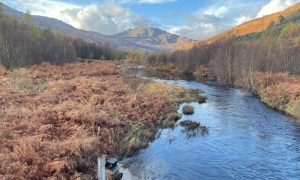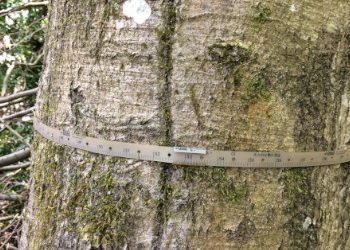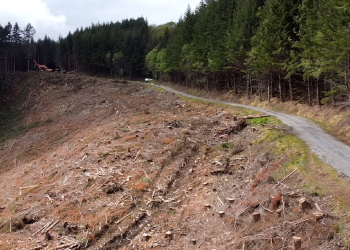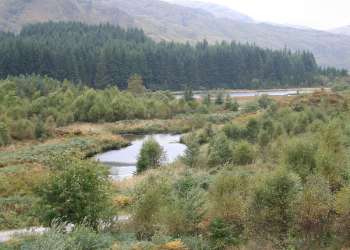
Forest Research are working closely with Forestry and Land Scotland to develop a forest restoration demonstration in Queen Elizabeth Forest Park as part of the Europe-wide, Horizon 2020 SUPERB project.
Recent storms with wind damage and severe flooding across the UK highlight the need to better understand the role that trees and forests can play in reducing the impacts of such events. Forest restoration measures that adapt forests to the changing climate can reduce the risks from these extreme events, and maintain or improve the delivery of ecosystem services to local communities and the broader society.
Researchers from Forest Research (FR) are working with Forestry and Land Scotland (FLS) to develop a Scottish forest restoration “Demo” at Queen Elizabeth Forest Park (QEFP) near Aberfoyle in the Loch Lomond and Trossachs National Park. This work is part of the EU Horizon 2020 Research and Innovation Programme, “SUPERB” project (Systemic solutions for upscaling urgent ecosystem restoration for forest-related biodiversity and ecosystem services) led by the European Forest Institute. SUPERB is a €20 million, four-year project with 36 partners in 16 countries, that will restore thousands of hectares of forest landscape across Europe, building on 12 large-scale forest restoration Demonstrators in forests that are experiencing a range of stressors and challenges.
Queen Elizabeth Forest Park was originally planted in the 20th century as an even-aged, predominantly Sitka spruce, forest with timber production as the main objective. It has been transformed in recent decades with considerable diversification of structure and species, and is now managed for a much wider range of objectives.
 Damaging floods in Aberfoyle village near QEFP have emphasized the need to explore how forest management can contribute to slowing river flow in extreme rainfall events. The SUPERB project, with its UK Demo Forest at QEFP, is providing and monitoring riparian woodland restoration and natural flood management near the Allt Glas, one of the many tributaries of the Duchray water that runs through Aberfoyle. Work starts this autumn in the building of natural flood management wooden structures including “leaky dams” and “timber bunds”, that are designed to slow peak flow in the Allt Glas. Floodplains alongside the Allt Glas are being planted with a mixture of native species to increase the roughness of the surrounding vegetation, thereby further slowing water flow during extreme rainfall events whilst increasing the biodiversity value of the area.
Damaging floods in Aberfoyle village near QEFP have emphasized the need to explore how forest management can contribute to slowing river flow in extreme rainfall events. The SUPERB project, with its UK Demo Forest at QEFP, is providing and monitoring riparian woodland restoration and natural flood management near the Allt Glas, one of the many tributaries of the Duchray water that runs through Aberfoyle. Work starts this autumn in the building of natural flood management wooden structures including “leaky dams” and “timber bunds”, that are designed to slow peak flow in the Allt Glas. Floodplains alongside the Allt Glas are being planted with a mixture of native species to increase the roughness of the surrounding vegetation, thereby further slowing water flow during extreme rainfall events whilst increasing the biodiversity value of the area.
Reducing the risks associated with extreme events together with enhancement of biodiversity are also central to the other SUPERB restoration sites being established in QEFP. These sites feature the development of Continuous Cover Forestry, a silvicultural transformation from even-aged, single species conifer stands that has the potential to reduce risk of wind damage and high elevation forest planting above the existing tree line to reduce the risks of soil erosion and landslides. A priority for SUPERB is to pull together the practical and scientific information gathered from each of these restoration activities and engage with stakeholders to understand the range of benefits and potential for upscaling at local and national scales.

Forest Lab enables UK woodland managers to become volunteer ‘stewardship scientists’ by joining science projects, collaborating with researchers and sharing data to support woodland resilience.

Explore our new case studies that demonstrate how forest adaptation measures can be applied to reduce the climate change risks faced at three different Scottish sites.

Forest Research are working closely with Forestry and Land Scotland to develop a forest restoration demonstration in Queen Elizabeth Forest Park as part of the Europe-wide, Horizon 2020 SUPERB project.

Forest Lab enables UK woodland managers to become volunteer ‘stewardship scientists’ by joining science projects, collaborating with researchers and sharing data to support woodland resilience.

Explore our new case studies that demonstrate how forest adaptation measures can be applied to reduce the climate change risks faced at three different Scottish sites.

Forest Research are working closely with Forestry and Land Scotland to develop a forest restoration demonstration in Queen Elizabeth Forest Park as part of the Europe-wide, Horizon 2020 SUPERB project.